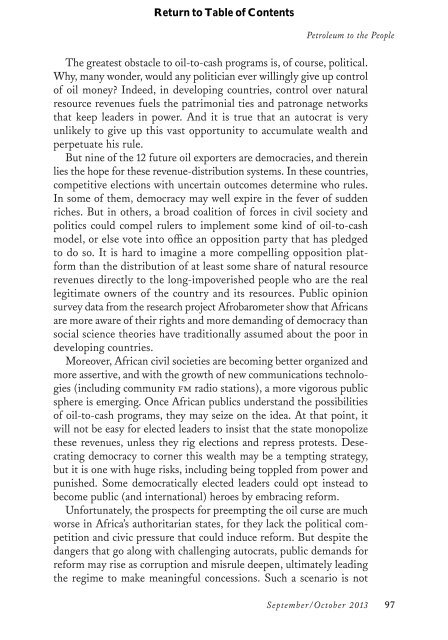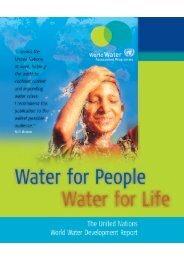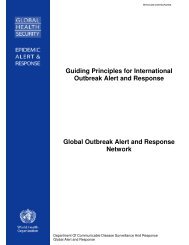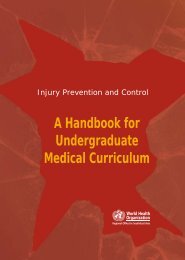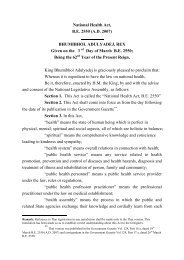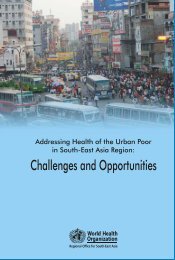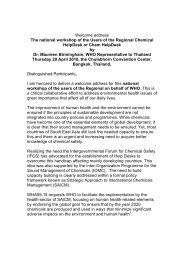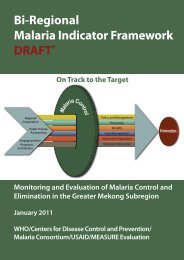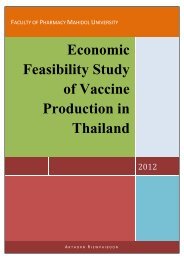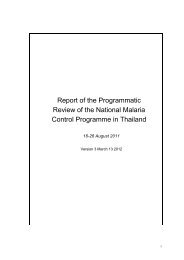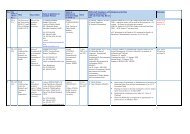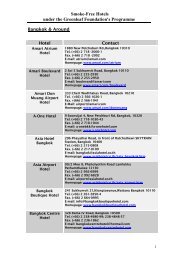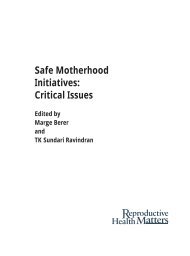Who Is Khamenei? - WHO Thailand Repository
Who Is Khamenei? - WHO Thailand Repository
Who Is Khamenei? - WHO Thailand Repository
Create successful ePaper yourself
Turn your PDF publications into a flip-book with our unique Google optimized e-Paper software.
Return to Table of Contents<br />
Petroleum to the People<br />
The greatest obstacle to oil-to-cash programs is, of course, political.<br />
Why, many wonder, would any politician ever willingly give up control<br />
of oil money? Indeed, in developing countries, control over natural<br />
resource revenues fuels the patrimonial ties and patronage networks<br />
that keep leaders in power. And it is true that an autocrat is very<br />
unlikely to give up this vast opportunity to accumulate wealth and<br />
perpetuate his rule.<br />
But nine of the 12 future oil exporters are democracies, and therein<br />
lies the hope for these revenue-distribution systems. In these countries,<br />
competitive elections with uncertain outcomes determine who rules.<br />
In some of them, democracy may well expire in the fever of sudden<br />
riches. But in others, a broad coalition of forces in civil society and<br />
politics could compel rulers to implement some kind of oil-to-cash<br />
model, or else vote into office an opposition party that has pledged<br />
to do so. It is hard to imagine a more compelling opposition platform<br />
than the distribution of at least some share of natural resource<br />
revenues directly to the long-impoverished people who are the real<br />
legitimate owners of the country and its resources. Public opinion<br />
survey data from the research project Afrobarometer show that Africans<br />
are more aware of their rights and more demanding of democracy than<br />
social science theories have traditionally assumed about the poor in<br />
developing countries.<br />
Moreover, African civil societies are becoming better organized and<br />
more assertive, and with the growth of new communications technologies<br />
(including community fm radio stations), a more vigorous public<br />
sphere is emerging. Once African publics understand the possibilities<br />
of oil-to-cash programs, they may seize on the idea. At that point, it<br />
will not be easy for elected leaders to insist that the state monopolize<br />
these revenues, unless they rig elections and repress protests. Desecrating<br />
democracy to corner this wealth may be a tempting strategy,<br />
but it is one with huge risks, including being toppled from power and<br />
punished. Some democratically elected leaders could opt instead to<br />
become public (and international) heroes by embracing reform.<br />
Unfortunately, the prospects for preempting the oil curse are much<br />
worse in Africa’s authoritarian states, for they lack the political competition<br />
and civic pressure that could induce reform. But despite the<br />
dangers that go along with challenging autocrats, public demands for<br />
reform may rise as corruption and misrule deepen, ultimately leading<br />
the regime to make meaningful concessions. Such a scenario is not<br />
September/October 2013 97


